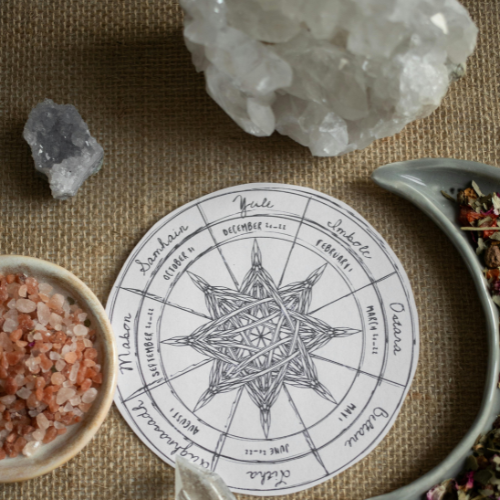We are delighted to be offering a series of individual seasonal workshops this year, led by Studio Owner Karine - “Sacred Seasons.”
These will follow the Wheel of the Year, and the eight Sabbats (celebrations / festivals) - more about this below.
Join for individual workshops, or purchase the Sacred Seasons Course, where you will save £40 (1 workshop free), and plenty of support in creating a yearly Sacred Seasons journal / grimoire / book of shadows!
The first of 8 workshops honours Imbolc, is on Saturday 8th February and there are just 2 in studio space remaining.
Click here to find out more information, and grab one of the last spots!
If there is enough interest, this workshop will also run again at the end of Feb. Click here for booking.
Our Studio Owners are passionate about seasonal living, and as well as our workshops reflecting this, our schedule is also tweaked seasonally to reflect the changing seasons.
Spring will see us add some new classes to the schedule as the natural world, and we, start to reawaken.
Now, more about Sacred Seasons!
What is the Wheel of the Year?
The Wheel of the Year represents the cyclical nature of the seasons and their associated spiritual significance. It consists of eight festivals/ celebrations or sabbats, which mark the changes in seasons and /or solar events. These festivals celebrate the Earth’s natural cycles and are rooted in ancient European pagan traditions.
What are the Sabbats?
Solar Festivals (based on solstices and equinoxes):
Yule (Winter Solstice)
Ostara (Spring Equinox)
Litha (Summer Solstice)
Mabon (Autumn Equinox)
Fire Festivals (cross-quarter days, roughly midway between the solstices and equinoxes):
Imbolc (beginning of spring)
Beltane (start of summer)
Lughnasadh or Lammas (first harvest)
Samhain (end of harvest, beginning of winter)
Where Does the Wheel of the Year Come From?
The Wheel of the Year draws from pre-Christian European traditions, particularly Celtic and Germanic festivals, as well as Norse mythology, and popularized in modern times by the Wiccan movement in the mid-20th century. The Wheel of the Year could be seen as a spiritual framework that honours the cycles of nature.
Over the past year it has become even more popular, which is wonderful to see, if those who teach about it are also honouring it as a part of their lifestyle.
As with everything, it is important to do your own research, take what resonates with you, and be discerning in regard to teachers and guides.
Who Celebrates the Sabbats?
The Sabbats are celebrated in modern paganism, particularly Wiccans and Druids. However, people from different spiritual backgrounds, including those interested in nature-based spirituality, often observe these festivals as well. You do not have to have any particular belief system to learn more about seasonal and cyclical living.
How Can We Celebrate Each Sabbat?
Yule (Winter Solstice)
Light candles to honor the return of the sun.
Decorate with evergreens, holly, and mistletoe.
Exchange gifts or feast with family.
Imbolc
Light candles or fires to honor the growing light.
Cleanse and bless your home for the coming spring.
Celebrate creativity or honour Goddess Brigid.
Ostara (Spring Equinox)
Decorate eggs as symbols of fertility and renewal.
Plant seeds to honour new growth.
Celebrate balance, as day and night are equal.
Beltane
Dance around a Maypole to honor fertility and abundance.
Light bonfires to celebrate life and passion.
Decorate with flowers and greenery.
Litha (Summer Solstice)
Celebrate the longest day of the year with outdoor gatherings.
Light candles or a fire to honour the sun's power.
Create flower crowns or sun-inspired crafts.
Lughnasadh (Lammas)
Bake bread or other foods from the first harvest.
Host a feast to celebrate abundance.
Offer gratitude for the Earth’s bounty.
Mabon (Autumn Equinox)
Celebrate balance as day and night are equal.
Decorate with autumn colors and seasonal produce.
Reflect on gratitude and give thanks for the harvest.
Samhain
Honour ancestors and loved ones who have passed.
Light candles or carve pumpkins to guide spirits.
Reflect on endings and prepare for the winter ahead.
Hopefully this gave you some useful information about the Wheel of the Year and seasonal living.
Of course, each sabbat can be personalized based on individual traditions, creativity, and connection to nature. Enjoy!
Workshop Dates
Interested in learning more, combined with Yoga and Holistic wellbeing?
Join us for a Sacred Seasons Workshop or the Seasonal Living Course.
The workshops can also be joined online, but the creative activities will require you to purchase your own equipment.
Imbolc 8th and 22nd February
Ostara 22nd March
Beltane 3rd May
Litha 28th June
Lughnasadh 2nd August
Mabon 20th September
Samhain 1st November
Yule 20th December
Sacred Seasons: Seasonal Living Course details here.






